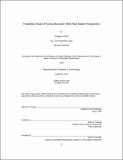Feasibility study of Korea biocluster with real estate perspectives
Author(s)
Choi, Junghun
DownloadFull printable version (2.085Mb)
Other Contributors
Massachusetts Institute of Technology. Center for Real Estate.
Advisor
Brian A. Ciochetti.
Terms of use
Metadata
Show full item recordAbstract
Globalization has created a dynamic and rapidly changing marketplace. A business must move quickly to capitalize on the changing environment. For example, many global biotechnology firms are seeking new geographical locations as part of their strategy to expand their business. Korea's biotechnology reputation and prospects as a potential site for biotech businesses is attracting increase attention. The Yeongjong Project is one choice. For the ongoing development of Korean bioclusters, this study will demonstrate potential and the attractiveness of Korea's biocluster sites, which may help international biotechnology firms relocate and reposition in Korea. Biotechnology is an umbrella term so this study identifies what the biotechnology and biotechnology industry are, as well as its characteristics and risks. Secondly, the biotechnology market will be analyzed both globally and domestically to understand the industry trend. This paper compares successful international bioclusters such as Tuas Medical Park in Singapore and University Park at MIT in the U.S, along with Korea's Wonju Medical Valley and Daedeok Techno Valley. This study explains different innovations and success factors, and characteristics of each cluster and whether the success factors are applicable to the Yeongjong Project. Finally, this thesis will identify the area and its characteristics suitable for a biocluster and propose appropriate product types through market feasibility.
Description
Thesis (S.M. in Real Estate Development)--Massachusetts Institute of Technology, Dept. of Architecture, Center for Real Estate, 2008. This electronic version was submitted by the student author. The certified thesis is available in the Institute Archives and Special Collections. Includes bibliographical references (leaves 88-89).
Date issued
2008Department
Massachusetts Institute of Technology. Center for Real Estate; Massachusetts Institute of Technology. Department of ArchitecturePublisher
Massachusetts Institute of Technology
Keywords
Architecture., Center for Real Estate.